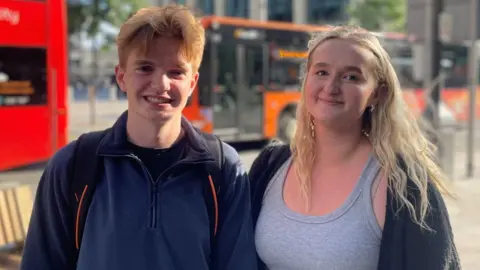Wales to introduce £1 bus single fares and £3 day passes for 16- to 21-year-olds
BBC reports a new concession will cap single bus fares at £1 and day tickets at £3 for people aged 16 to 21 across Wales.
Wales to introduce £1 bus single fares and £3 day passes for 16- to 21-year-olds
BBC reports a new concession will cap single bus fares at £1 and day tickets at £3 for people aged 16 to 21 across Wales.
The BBC reported that single bus fares across Wales will be reduced to £1 and full-day passes to £3 for passengers aged 16 to 21, in a move aimed at cutting travel costs for young people. The scheme was described as an attempt to make public transport more affordable for those travelling to school, college, university and work.
Young people interviewed in Cardiff said the change could alter their travel choices and ease financial pressure. Evan Stoddart, 20 and a Cardiff student, said he did not use buses regularly but that a £1 fare might encourage him to do so, and stressed the importance of keeping public transport costs low to help people get to and from education and employment. Holly Well, 20, from Exeter and studying in Cardiff, said she mainly walked around the city but believed reduced fares would open up more opportunities for young people and noted that many cannot afford to drive while trains remain expensive. Oliver Reaper, 24 and currently without a car, said having access to affordable transport "is always a win" and that cheaper fares would have made a significant difference when he was a student on a tight budget.

The BBC account did not include comprehensive operational details such as the start date of the concession, how eligibility will be verified, or whether the scheme will be implemented universally by all bus operators in Wales. The report stated the fares apply to those aged 16 to 21 but did not specify whether that includes full-time students studying outside Wales, part-time workers, or how long the entitlement will last for an individual who turns 22 during the period.
Officials and campaigners have long argued that lower fares can increase bus usage, particularly among young people facing financial constraints. Proponents say cost reductions can improve access to education and employment, reduce social isolation, and shift journeys from private cars to public transport, potentially easing traffic congestion and cutting emissions. The students quoted by the BBC directly cited affordability, the high cost of rail travel, and the expense of driving as reasons the concession could change their mode of travel and reduce reliance on taxis.
Bus operators in Wales work under a mix of commercial and contracted services, and fares can vary by operator and route. The extent to which the reduced fares will be subsidised, and by which government or authority, was not set out in the BBC report. Questions about funding, compensation to operators for lower revenue per journey, and whether the concession will be ring-fenced to off-peak travel or apply to all local services remain unanswered in the details provided.
Transport policy in the devolved governments of the UK has increasingly focused on affordability and access. In recent years, various initiatives have sought to make public transport cheaper for targeted groups, including students and older residents, or to promote simplified fare structures. Advocates of fares reform argue that predictable, low-cost tickets make bus travel more attractive and easier to budget for, particularly for lower-income households and young people entering the labour market.
Reaction among young people in Cardiff in the BBC sample was largely positive. Stoddart said lower fares would encourage him to use the bus more; Well said the reduced prices would give young people more opportunities in the city; and Reaper described affordable transport as an important factor for people without access to a car. All three said lower bus fares would make them think twice before using taxis.
While passengers and campaigners highlighted potential personal and social benefits, industry stakeholders will be watching for clarity on administration and funding. Local authorities and transport bodies typically negotiate with operators and may set eligibility criteria, issue concessionary travel cards, or subsidise services to make reduced fares viable. The specifics of implementation—such as whether a smartcard or a digital verification will be required—were not provided in the BBC story.
The BBC indicated the concession applies across Wales, suggesting a Wales-wide scheme rather than a pilot limited to a single city or region. However, the mechanics of applying the fares consistently across different operators and service types—urban versus rural routes, for example—were not detailed in the report.
The announcement adds to wider debate about how to support young people facing high living costs and transport price inflation. Bus fares and rail fares have both been areas of public concern when household budgets are squeezed, and targeted concessions are one tool governments use to address affordability while attempting to maintain service levels.
Further details on eligibility, rollout timeline, administrative arrangements and funding were not set out in the BBC report. Stakeholders, including local authorities and bus companies, are likely to await formal guidance to understand how the policy will be put into practice and what it will mean for timetables, ticketing systems and operator revenue models.
Sources
- https://www.bbc.com/news/articles/c93dvw0dp2yo?at_medium=RSS&at_campaign=rss